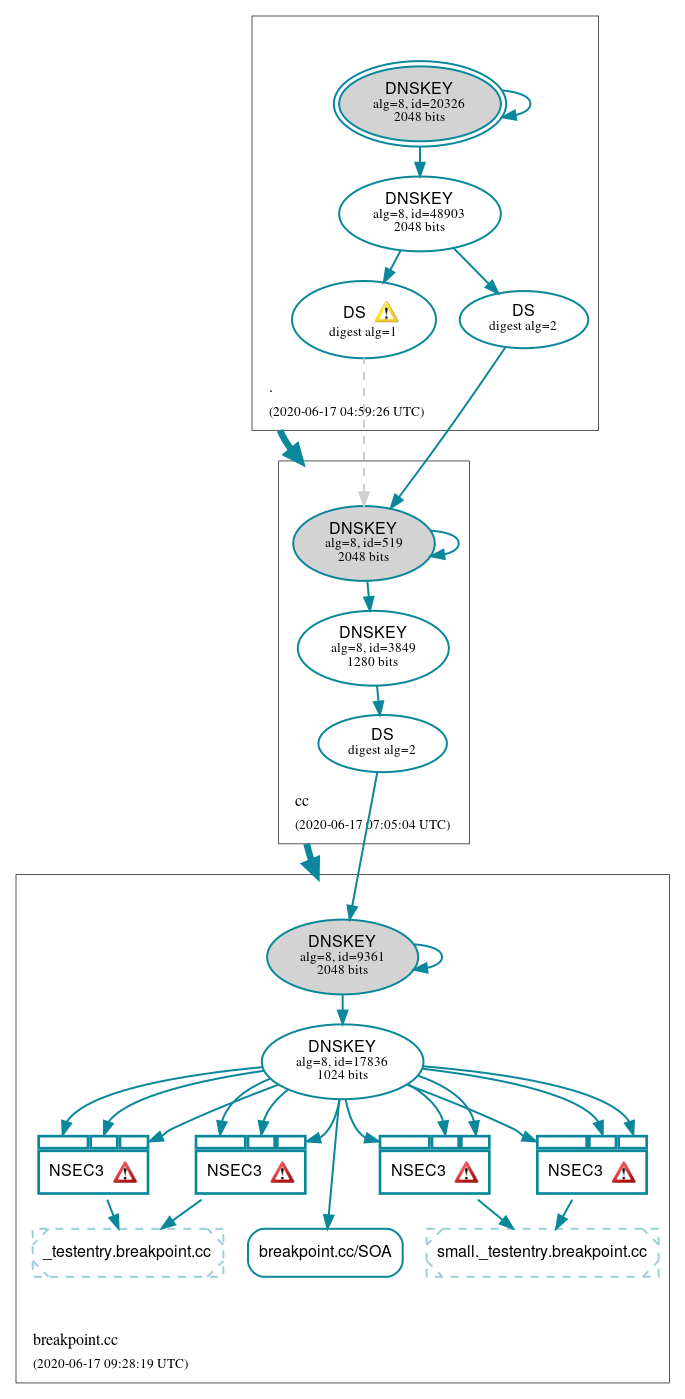small._testentry.breakpoint.cc
Updated:
2020-06-17 09:28:22 UTC (1651 days ago)
Go to most recent »
Notices
DNSSEC Authentication Chain
 RRset status
RRset status
Secure (3)
- _testentry.breakpoint.cc/A (NXDOMAIN)
- breakpoint.cc/SOA
- small._testentry.breakpoint.cc/A (NXDOMAIN)
 DNSKEY/DS/NSEC status
DNSKEY/DS/NSEC status
Secure (13)
- ./DNSKEY (alg 8, id 20326)
- ./DNSKEY (alg 8, id 48903)
- NSEC3 proving non-existence of _testentry.breakpoint.cc/A
- NSEC3 proving non-existence of _testentry.breakpoint.cc/A
- NSEC3 proving non-existence of small._testentry.breakpoint.cc/A
- NSEC3 proving non-existence of small._testentry.breakpoint.cc/A
- breakpoint.cc/DNSKEY (alg 8, id 17836)
- breakpoint.cc/DNSKEY (alg 8, id 9361)
- breakpoint.cc/DS (alg 8, id 9361)
- cc/DNSKEY (alg 8, id 3849)
- cc/DNSKEY (alg 8, id 519)
- cc/DS (alg 8, id 519)
- cc/DS (alg 8, id 519)
 Delegation status
Delegation status
Secure (2)
- . to cc
- cc to breakpoint.cc
 Notices
Notices
Errors (9)
- NSEC3 proving non-existence of _testentry.breakpoint.cc/A: An iterations count of 0 must be used in NSEC3 records to alleviate computational burdens. See RFC 9276, Sec. 3.1.
- NSEC3 proving non-existence of _testentry.breakpoint.cc/A: An iterations count of 0 must be used in NSEC3 records to alleviate computational burdens. See RFC 9276, Sec. 3.1.
- NSEC3 proving non-existence of _testentry.breakpoint.cc/A: An iterations count of 0 must be used in NSEC3 records to alleviate computational burdens. See RFC 9276, Sec. 3.1.
- NSEC3 proving non-existence of _testentry.breakpoint.cc/A: An iterations count of 0 must be used in NSEC3 records to alleviate computational burdens. See RFC 9276, Sec. 3.1.
- NSEC3 proving non-existence of small._testentry.breakpoint.cc/A: An iterations count of 0 must be used in NSEC3 records to alleviate computational burdens. See RFC 9276, Sec. 3.1.
- NSEC3 proving non-existence of small._testentry.breakpoint.cc/A: An iterations count of 0 must be used in NSEC3 records to alleviate computational burdens. See RFC 9276, Sec. 3.1.
- NSEC3 proving non-existence of small._testentry.breakpoint.cc/A: An iterations count of 0 must be used in NSEC3 records to alleviate computational burdens. See RFC 9276, Sec. 3.1.
- NSEC3 proving non-existence of small._testentry.breakpoint.cc/A: An iterations count of 0 must be used in NSEC3 records to alleviate computational burdens. See RFC 9276, Sec. 3.1.
- breakpoint.cc/CNAME has errors; select the "Denial of existence" DNSSEC option to see them.
Warnings (13)
- NSEC3 proving non-existence of _testentry.breakpoint.cc/A: The salt value for an NSEC3 record should be empty. See RFC 9276, Sec. 3.1.
- NSEC3 proving non-existence of _testentry.breakpoint.cc/A: The salt value for an NSEC3 record should be empty. See RFC 9276, Sec. 3.1.
- NSEC3 proving non-existence of _testentry.breakpoint.cc/A: The salt value for an NSEC3 record should be empty. See RFC 9276, Sec. 3.1.
- NSEC3 proving non-existence of _testentry.breakpoint.cc/A: The salt value for an NSEC3 record should be empty. See RFC 9276, Sec. 3.1.
- NSEC3 proving non-existence of small._testentry.breakpoint.cc/A: The salt value for an NSEC3 record should be empty. See RFC 9276, Sec. 3.1.
- NSEC3 proving non-existence of small._testentry.breakpoint.cc/A: The salt value for an NSEC3 record should be empty. See RFC 9276, Sec. 3.1.
- NSEC3 proving non-existence of small._testentry.breakpoint.cc/A: The salt value for an NSEC3 record should be empty. See RFC 9276, Sec. 3.1.
- NSEC3 proving non-existence of small._testentry.breakpoint.cc/A: The salt value for an NSEC3 record should be empty. See RFC 9276, Sec. 3.1.
- cc/DS (alg 8, id 519): DNSSEC implementers are prohibited from implementing signing with DS algorithm 1 (SHA-1). See RFC 8624, Sec. 3.2.
- cc/DS (alg 8, id 519): DNSSEC implementers are prohibited from implementing signing with DS algorithm 1 (SHA-1). See RFC 8624, Sec. 3.2.
- cc/DS (alg 8, id 519): DS records with digest type 1 (SHA-1) are ignored when DS records with digest type 2 (SHA-256) exist in the same RRset. See RFC 4509, Sec. 3.
- cc/DS (alg 8, id 519): DS records with digest type 1 (SHA-1) are ignored when DS records with digest type 2 (SHA-256) exist in the same RRset. See RFC 4509, Sec. 3.
- breakpoint.cc/CNAME has warnings; select the "Denial of existence" DNSSEC option to see them.





 JavaScript is required to make the graph below interactive.
JavaScript is required to make the graph below interactive.



